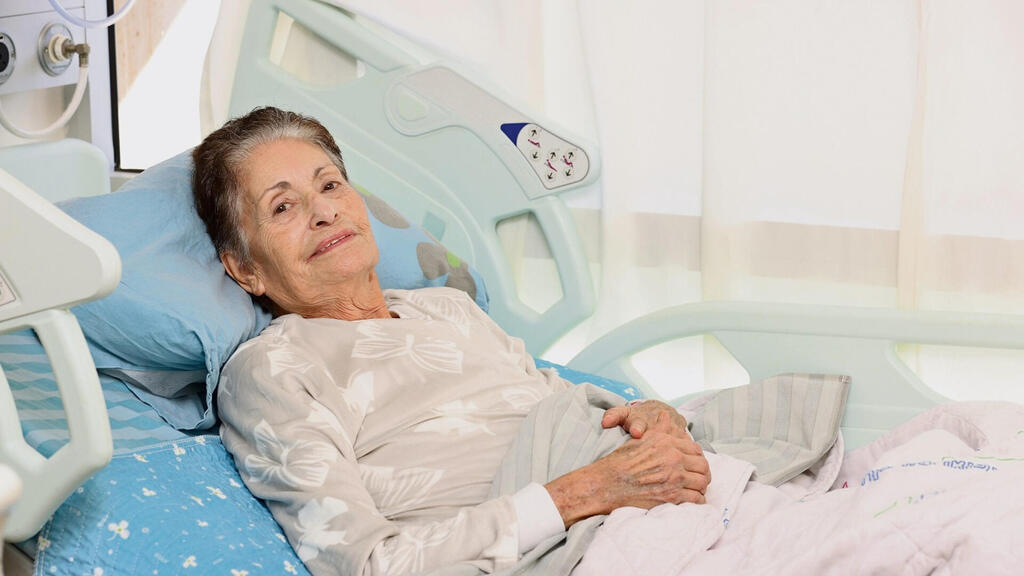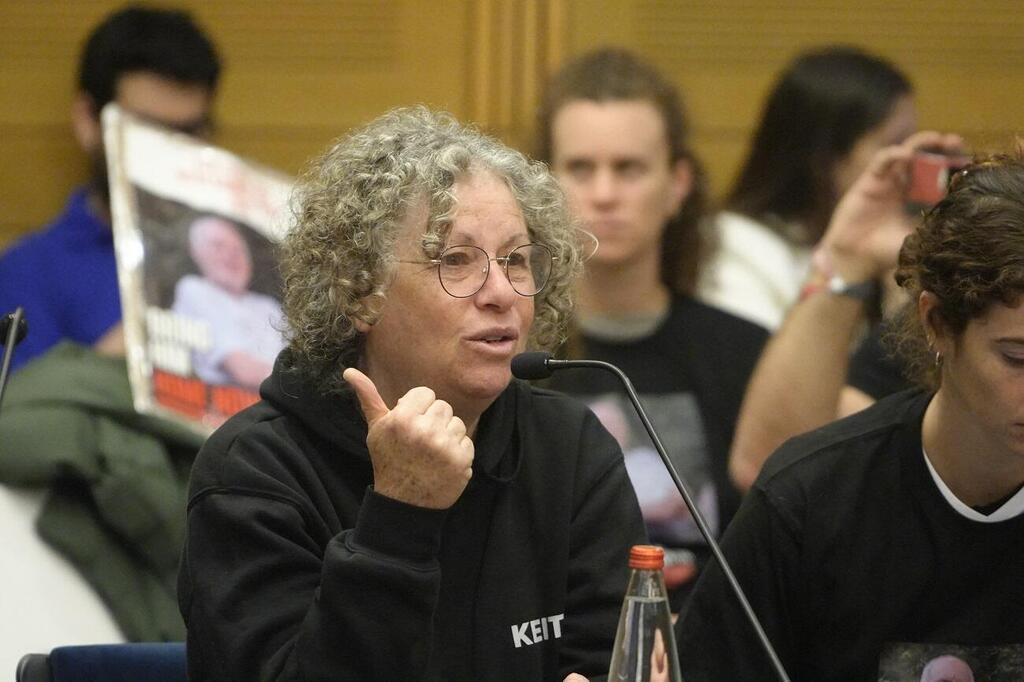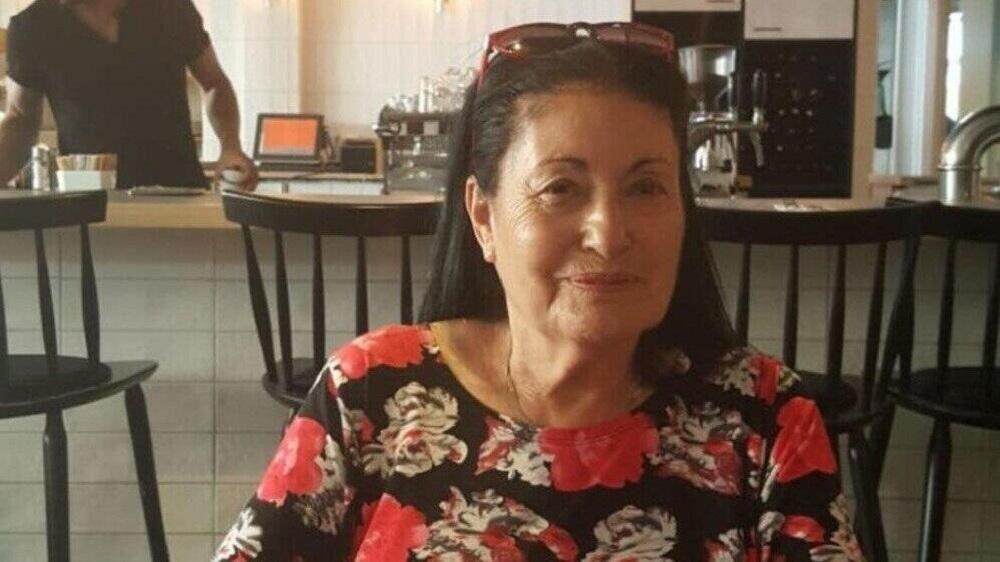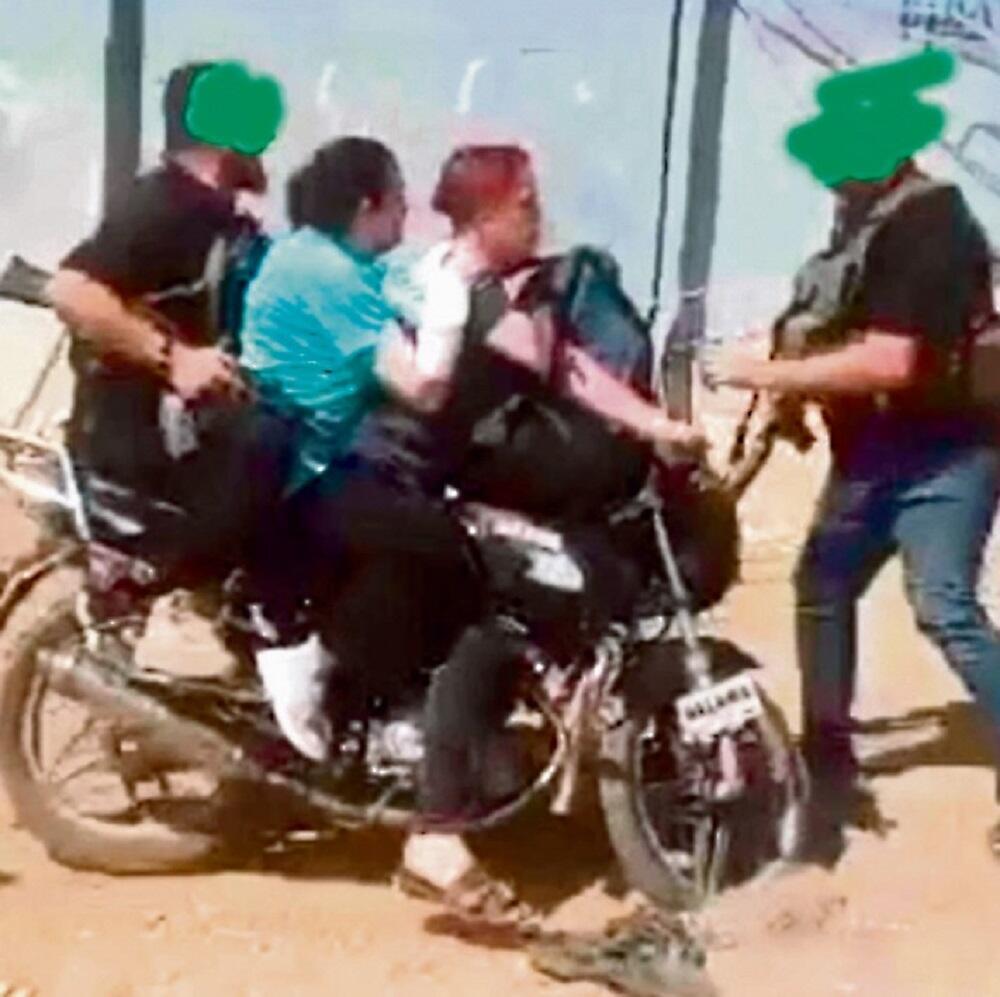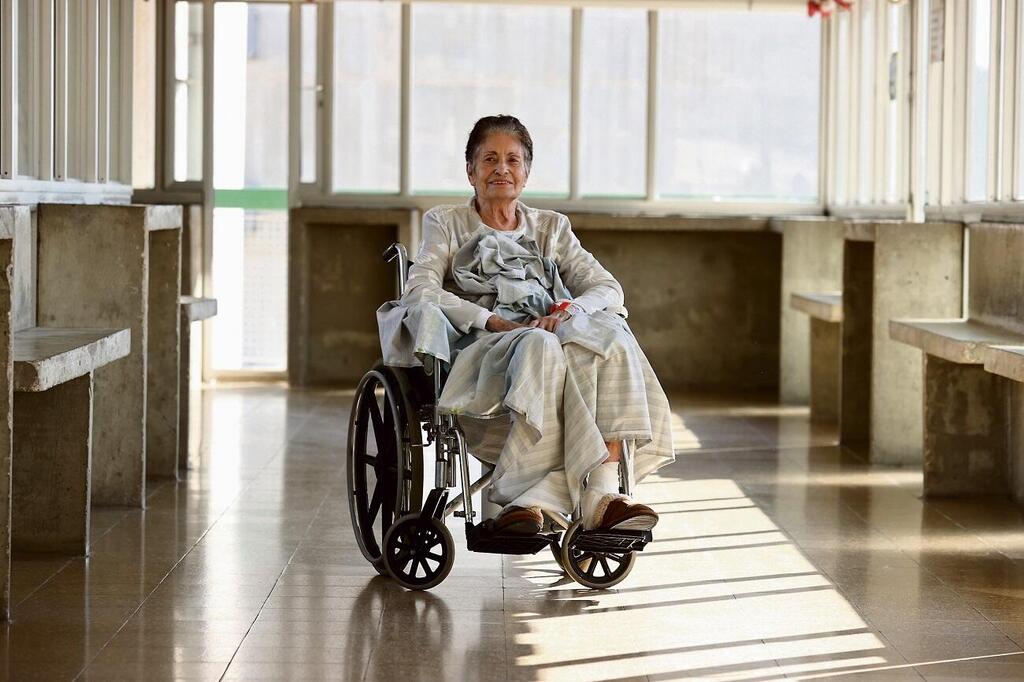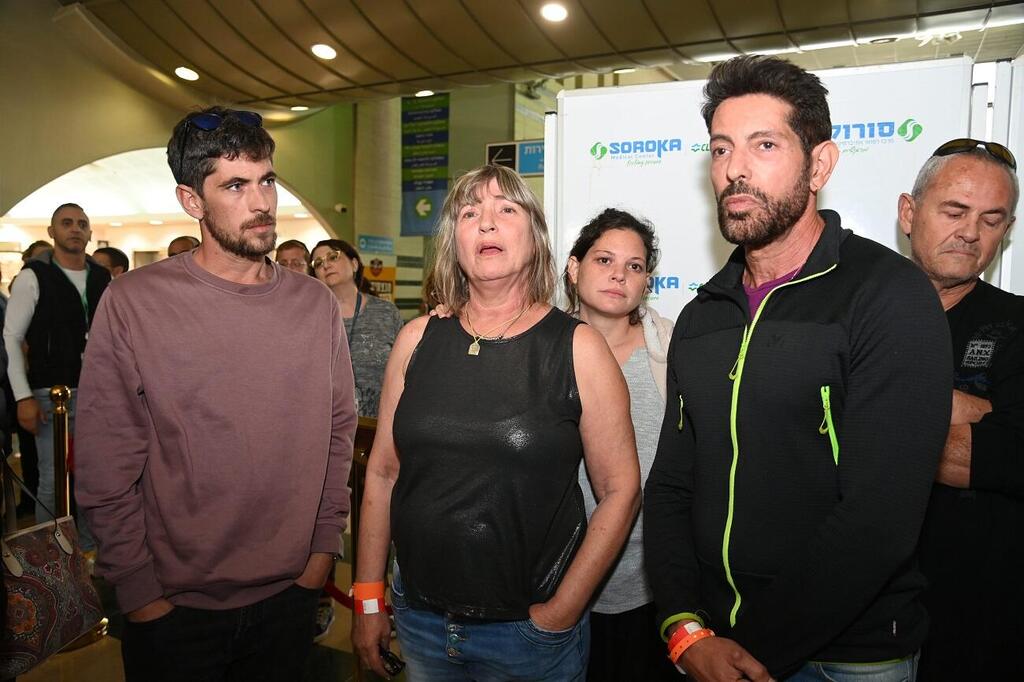Getting your Trinity Audio player ready...
Spending 49 days alone in the depths of Hamas tunnels, with a little artificial light coming through a crack in the door, six dates a day and some water, one thing kept 84-year-old Elma Avraham sane.
Read more:
It was "the game Buzz," she says, her laugh still sounding very weak. "Every day I managed to count up to 100 until I was out or fell asleep. I didn't want to get tired of it. So I saved it for the hard moments, the hard hours, especially when I started to feel bad. I didn't know what was happening to my children, so I forced myself not to think about them. I didn't concern myself with anything except surviving. I just cut off my thoughts."
Did you not think about death?
"No, I didn't think about death and I didn't ask myself if I would come back or not. I didn't ask anything. I had no one to ask, I had no one to reflect with. But what is certain is that I had never for one moment imagined that I would return in this condition, injured, unconscious, not being able to walk."
Upon her arrival at Soroka Medical Center on the day of her release, she teetered between life and death. Her body temperature had plummeted to 28 degrees Celsius (82.4 F), her heart rate was a mere 40 beats per minute, and she was in an unconscious state.
For many days the medical staff at the hospital fought for her life until she was out of danger. Even today, three months later, she is still hospitalized, not walking independently. She has a long recovery process ahead.
Do you remember anything from the evacuation?
"I don't remember anything about my return to Israel. The IDF representative who accompanied me after I was transferred from the Red Cross came to visit me after I recovered and told me that I was unconscious the entire flight. The deputy director of the hospital showed me the pictures he took of me, where he is seen picking me up from the plane and bringing me here. I did not look well, having lots of blankets on me, hooked to an IV."
Aviva Siegel, who was released with you, told your children that she made sure to keep you awake all the time, talking to you, keeping you warm. She asked you to hold on until you reach the hospital, so you get the chance to say goodbye to your children.
"I heard about it later, but I don't remember that. The truth is that I have almost no memory of the last days in captivity, because my situation was very bad."
The terrible conditions in which she was kept are evidenced, perhaps most of all, by her feet. "Very quickly in captivity I lost the ability to get out of bed, so they started dragging me from place to place, and my legs were filled with dragging injuries. Until now, the part of my body that hurts the most is my legs, especially my heels. Before the kidnapping I could walk easily, today I can't walk at all."
Six dates a day
Do you have a message for the government, which has to make difficult decisions these days?
"I don't understand why they hesitate, the hostages must be released, all of them. Immediately! They should have been released by now. Look at what I've been through. It's hell. This is why I'm giving this interview; we need to bring them home as soon as possible."
Although she vaguely recalls her last days in Hamas captivity as she was half-conscious, there's one image she remembers clearly - the one that actually heralded her approaching release.
"Suddenly they handed me a bottle of water and I realized that something was changing. I realized that I might be returning home, I regained hope. Until then, I would get in the morning six cold dates from the fridge, that's the only food I got, from the first day to the last day in the tunnels. There were days when I wouldn't get any dates at all. I might not have eaten for a few days in a row, but it felt like one day. My stomach shrank to the extent that I didn't feel hungry.
"At first I could still walk, my hands were injured, but I was able to get up from the mattress and ask to go to the bathroom. As time passed, I was no longer able to get out of bed, I just laid down. And when the guard would bring me water, he would put it by the door, far away from me, because he knew that I wouldn't be able to get up and reach it. The food was close, the water was very far, so it turned out that I hardly drank any water."
Did you ask them to place the water closer to you?
"I asked, it didn't help. Until I gave up asking."
During her 49 days in captivity, Avraham was held alone and did not communicate with anyone. Throughout this period, she did not know what happened to her loved ones, she had no idea that there were other hostages besides her, nor that there was a war going on outside.
"I had no idea how long It has been since I was kidnapped. Time has no meaning in captivity, there is no way to count it. And as I told you, I had no thoughts about anything, besides playing Buzz once a day."
I met Elma in the new physiotherapy room that was built in Soroka and was inaugurated out of necessity two months ago to accommodate the large number of patients that have been occupying the hospital since October 7.
She is sitting in a wheelchair, behind her is the oxygen cylinder to which she was continuously connected until a while ago. Recently, the medical team decided to wean her off the oxygen during the day and re-connect it at night. The effort involved in breathing is still considered life-threatening for her.
Before the interview, her son Roy gives her three painkillers for the pain in her legs. She sips some water and coughs. The act of swallowing is also not easy for her. "Shall we begin?" She asks, "I'm sorry, I'm very tired, but it's important for me to speak up, to help in what I can to explain how important it is that these people, my friends from the kibbutz who were kidnapped, return home."
She was born in Tel Aviv. She married Gaby Ravitz, and the couple had two children - Uri and Tali. When the children were still small, the two divorced and in 1974, Elma met Yaakov Avraham, who was a member of Kibbutz Nahal Oz, a widower with two children: Ma'ayan and Ronen. Elma and her children moved to live on the kibbutz, and she had another child with her new husband - Roy. Later, this marriage also ended.
"I loved Nahal Oz very much," says Elma, "A kibbutz is fun, there are huge spaces but most importantly is the tranquility in there. It was good for me to grow up there and raise my children there."
Two years ago, Ma'ayan, Yaakov's daughter who was raised by Elma, died of cancer at the age of 48. "Since Ma'ayan's passing, my mother started suffering from medical problems, mainly recurring wounds on her legs," says Roy.
Throughout her 50 years on the kibbutz, Elma changed jobs many times. "That's how it is on our kibbutz," says Elma. "In recent years I've engaged with handicrafts, ceramic flowers that I've made. My whole garden was made of ceramics. I wonder what's left of it there now."
She remembers well the morning of October 7, the day her life turned upside down. "I woke up to the sound of gunshots. I was alone at home and immediately entered the safe room. After a while I heard a lot of noise from inside the house. Sounds of things smashing, breaking. I opened the door of the safe room to a sliver to see what was happening and there I saw terrorists walking around my house. I shut the door tightly, but I could not lock it, so I leaned on the door with all my strength so the terrorists could not open it. As a result, the veins in my hands were bulging from the pressure."
It didn't help. The terrorists managed to break through the door - and Elma was pushed back forcefully. "I got hit hard on this hand and it was bleeding," she raises her left hand to show the scar. "One of the terrorists who was in the safe room saw that I was bleeding. He took out a personal bandage from his pocket and bandaged my hand. Then they took me out to a taxi that was waiting on the road."
Do you remember how you felt in those moments?
"I remember not looking to the sides, I was scared and terrified."
When they reached the main gate of the kibbutz, the terrorists took Elma out through a gap. "From there they put me on a motorcycle, leading me straight to Gaza through the fields."
What do you remember from this ride?
"The driver got off the motorcycle first so I could get on the back. I've never been on a motorcycle, I'm an old woman, and they had to help me to get on it so they could drive me. I had a very difficult ride, bumps all the way, an unpleasant road, certainly not suitable for my age."
Next stop: Gaza
"There were crowds in the street. They chased our motorcycle and we drove fast so they wouldn't stop us. I remember a lot of yelling, words in Arabic that I didn't understand. While we were driving away, they cut my other hand, right hand, which wasn't injured until then, and I started bleeding from there as well.
"They brought me to a mosque and made sure no one would enter it. From the outside I hear dozens of Gazans who want to reach me. They literally stopped them from breaking in. I was in the mosque for a few minutes and then they transferred me to Malik's house, that's what they called it. It was quite a nice house, a family lived there. When I arrived there, they let me shower for the first time. It was also the last time I showered in captivity. The family comprised of a father, a mother and six children. A 30-year-old woman was the one who let me shower and fed me."
How long did you stay there?
"One day. I remember that this family had a long, curved knife, with which they chopped the food I ate that day. The vegetables were very tasty. The woman also gave me pita bread and literally fed me because my hands were badly injured, and I was weak. I remember I was in pain."
Did you talk to her?
"Apart from telling me that she was 30 years old and that the house was called 'Malik,' she did not speak to me. Nor did I ask any questions. No one explained to me what was going on. The next day they put a hijab on me and moved me to another place. We drove by car through the streets of Gaza, but it was dark, and I didn't know where they took me. In retrospect it turned out that it was the entrance to one of the tunnels.
"We went down a lot of stairs, and the lower we went, the darker it got. And that's it. This is where I stayed from that day until I was released. Sometimes I felt like I was there for two days, sometimes more, I didn't know if it was day or night. At first, I could still step on both feet, so I walked independently. I don't even remember the injuries in my legs. I do remember that no one took care of me."
And all this time you were alone?
"It was only me and the guard outside the door; I don't remember if he was armed. The room was empty. I didn't meet anyone during my entire time there, certainly not Israelis. The guards didn't speak Hebrew, and I had no idea what was going on outside, nothing. I realized that I was kidnapped, but I didn't understand for how long."
Can you describe the room?
"Except for a mattress on the floor, it was empty. Every day felt terrible. I would just sit on the mattress, or lie down, thinking only of the game. I didn't absorb anything there. I didn't allow myself to feel; what could I feel? I didn't allow myself to think about what was happening to me, what was being done to me. How could I possibly contain it?"
Did you hear bombs outside? Sounds of war?
"I didn't hear a sound."
The following account highlights Elma's remarkable resilience and determination: Despite being surrounded by terrorists in her home and suffering from a bleeding hand, she insisted on retrieving her medicine box from the room, a decision that ultimately saved her life.
"I took the pill box from the safe room, which contained medicines organized by the days of the week and held it close to me all the way until I reached the tunnel. I knew that I shouldn't take the pills all at once, but I should rather save them in case I will be there for a long time. So, I took them once in three days."
"When I ran out of medicine, I told in Hebrew the kidnapper who was guarding me that if I didn't take my Eltroxin (hypothyroidism medicine), that would be the end of me. He brought a translator who knows some Hebrew, and I explained to him again. I also explained that this was one of ten medicines that I was able to take with me, but I had to take this one in particular, otherwise I wouldn't last. He understood, and a few days later I received a box of medicine, which also ran out at some point."
Meanwhile, the conditions in which she was kept worsened. "They didn't clean the room at any point," she says. "Of course I couldn't clean, I was in bed the whole time. When I got weaker and had to go to the bathroom, they would pull me, but the pulls hurt, so I stopped asking. From a certain point I stopped going to the bathroom at all."
One thing she did ask her captors. "I wanted to watch TV, to know a little bit what was happening around me. It was such an impulse, I shouted from bed 'TV!' But no one answered. It was my last request, the only one before I was released, before I lost consciousness."
Against all odds
Here in Israel, Elma's three children, Uri, Roy and Tali, were waiting for her. They are active in the Hostages and Missing Families Forum, star in every news broadcast, go to the Knesset. Uri met with the Red Cross, brought his mother's medicines, begging them to let it in, saying that his mother's time was short. They answered him, of course, that this was impossible.
When did you first learn she was alive?
Roy: "I saw on Telegram the video of her kidnapping that was circulated. Three and a half weeks later an intelligence officer came and said there was a sign of life from her. But after that we heard nothing."
Elma was released on November 26, among the third batch of hostages that was released. She was handed over to the Red Cross by a Hamas terrorist, faint and weak, her eyes devoid of expression. In this phase, the four members of the Goldstein-Almog family, the four Brodutch family members, sisters Ela and Dafna Elyakim, 62-year-old Aviva Siegel and also four-year-old Abigail Edan were released. In addition, Roni Krivoi, a dual Russian-Israeli citizen who worked at the Nova music festival, and three more Thai nationals were released from Hamas captivity.
"They called us the evening before, telling us to wait at Wolfson Medical Center as Mom was getting released," Roy recalls. "The next evening, a driver came to pick us up to Wolfson. We were thrilled, we thought that if Mom was brought to the hospital, it meant that everything was fine with her. But when we got there, they told us that we should go to Soroka Medical Center instead. At that moment, we fell silent. We drove from Wolfson to Soroka in silence, we didn't say a word. We knew it didn't bode well. We prayed that we would get a chance to say our last goodbye. When we arrived at Soroka, we ran to Mom like crazy, and we saw her so thin, weighing 17 kilos less. It was a very difficult sight."
Elma: "I didn't feel like I was losing so much weight. In the last two weeks, I was half-conscious, but because I didn't walk, I didn't have a sense of my body at all."
What is the first thing you say to her?
"We all told her that we loved her. We kept saying it."
Elma was immediately admitted to intensive care. "She was sedated and put on ventilator," Roy recalls, "she was in such a bad condition that the doctors wanted to spare her the physiological effort in breathing."
Uri: "In the first three days, it was not at all clear if she would make it out alive. They asked us if she talked about prolonging life. Then they stopped the anesthesia, and she woke up. The doctor was shocked. The medical staff also cried."
Dr. Amit Frenkel, director at Soroka's critical care outreach unit, remembers very well the moment Elma arrived. "We immediately realized that she was in a very severe condition," he says, "and it was imperative to transfer her urgently to intensive care in order to save her life. We also understood that her situation required us to have a difficult conversation with the family. I called on her children, I sat with them in my room, explaining that considering all the data, her age, her medical background, and the condition in which she arrived - her chances of survival were very low.
Dr. Frenkel: "In retrospect, I realize that in this conversation with the family I failed to take into consideration one very important element - the special material that Mrs. Avraham is made of. I was amazed to discover how much courage, strength and fighting spirit this amazing woman has. Against all odds, against all the statistics in medical literature, she managed to recover within a few days."
"In retrospect, I realize that in this conversation with the family I failed to take into consideration one very important element - the special material that Mrs. Avraham is made of. I was amazed to discover how much courage, strength and fighting spirit this amazing woman has. Against all odds, against all the statistics in medical literature, she managed to recover within a few days. I remember the first time I was able to talk to her, I leaned over and asked her how she was, and she said, 'I'm fine. how are you, doctor?' I will cherish this as one of the greatest moments I've ever had, not only as a doctor, but also as an Israeli."
Both her relatives and the medical staff were amazed to discover how neglected she was during her captivity. "We were shocked," says Dr. Frenkel, "we couldn't believe that human beings were capable of acting with such criminal negligence toward an 84-year-old woman."
Roy: "Mother didn't get up to the toilet during most of her time in captivity, and when she returned to Israel, she suffered from first-degree burns on her lower body parts. Her hair was full of knots and lice that took days to get rid of. I have never seen such neglect."
At what point do you start explaining to her what was going on?
Roy: "We have talked to Mom from the first second she arrived, but it took her four days to regain consciousness. She was very drowsy at first."
Returning to life, to functioning, is not easy. "When I recovered," says Elma, "when I regained consciousness, the worst pains began. I finally came back to understand, to think, I allowed myself to feel. This is when I realized that I couldn't walk, even though I have already lost that ability there."
Dr. Frenkel: "When we look at a patient's rehabilitation process from a professional point of view, we take into consideration two main parameters. The first is the severity of the disease and the hospitalization period needed to stay in intensive care, and the second parameter is, of course, the patient's age. Both parameters were not in her favor, and without her extraordinary powers, in my opinion, she would not have been able to survive this tremendous event."
Uri: "In the first week, Mom didn't speak at all, she only moved her lips. Then, with every passing day, she managed to add another word, but only in whispers. It was difficult for her to speak because she didn't speak to anyone for seven weeks. Today, she is in a totally different condition, joking with us, making sure that we feel fine. A few days ago, she asked me, 'Uri, tell me, are you bored here'"?
Roy: "In terms of her personality and character, she's the same Mom we knew, but physically, she's a completely different woman. From a woman who would cook for herself almost every day, driving me crazy to come over and eat, to a woman who can't even stand on her own."
Uri: "On the other hand, the nurse just told me today that it's amazing that Mom smiles so much. She is very amicable; she would always give compliments."
When did she start talking about what she has gone through?
"She is still talking. A little at a time. The first words she said to us were 'I'm back.' At first, we didn't mention it, we didn't want her to be overwhelmed. It took us time to talk about the 'elephant in the room'. We did it very carefully, with the aid of a social worker. When we told her, 'Mom, you were there for seven weeks,' she replied, 'Wow, wow'."
Elma: "They are amazing children; they don't leave me alone for a second. I slowly understand what they did for me, bringing me back from captivity, what many people did for that."
How do you feel now? Have you processed what you've been through?
"I'm still weak, and I haven't really processed it yet. I don't even dream about it yet. But I do think all the time, 'why, why did they do this to us, why did they do this to me, why did they enter my house in particular?' My house is divided into two sections, they didn't get to the rear part of the house. They didn't go in there at all. They did kidnap my neighbor, Tzachi Idan. Yesterday, friends from the kibbutz came to visit me and showed me pictures of me with him. I was excited. We were very good neighbors."
Who else of your friends have been kidnapped or murdered?
"My good friend Ilan Fiorentino, the military coordinator of the alert squad of the kibbutz. He was murdered when he saved 13-year-old Ariel Zohar, whose parents, Yasmin and Yaniv, and his sisters Tchelet and Keshet were murdered. I also knew Shoshi Brosh, who was murdered, and the late Shlomo Ron. Every time I remember these names it surprises me anew, there are so many of them. Haim Livneh, Yasmin Zohar's father, was also a close friend of mine. These are people I used to see every day."
7 View gallery
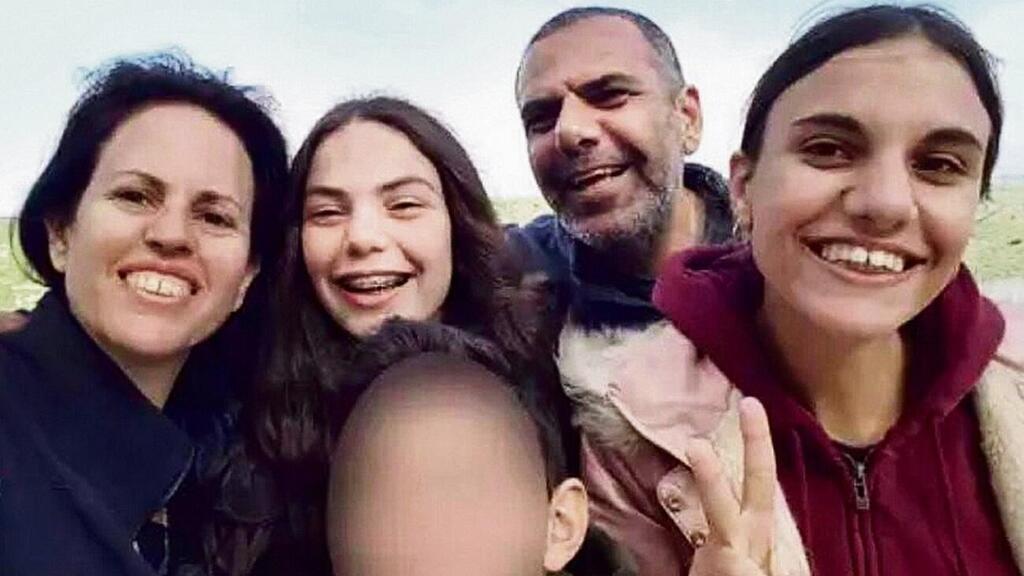

The Zohars (from left to right): Mother Yasmin, daughter Tchelet, father Yaniv and daughter Keshet; bottom: Ariel
(Photo: Family album)
Roy: "Do you remember the guy who used to watch over my dog when I needed help? Roy Edan? He was also murdered. He lived on our kibbutz before he moved to Kfar Aza."
Elma: "Of course I remember him. But sometimes I also forget. Little by little, my children are telling me more and more details, about someone who was kidnapped or murdered. It's horrible."
Do you cry sometimes?
"No. I don't cry, I didn't cry in Gaza either. There's something in me that doesn't let me cry. I'm a kibbutznik, that's how we are."
Where do you find hope?
"I find hope in rehabilitation; by making gradual progress. I think I'll be able to walk again soon. I can picture that. I also find hope in the fact that I'd like to go back to live in Nahal Oz when it is safe enough. I don't see myself living anywhere else. It will be difficult for me to return without all my friends, but this is our home."



